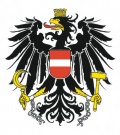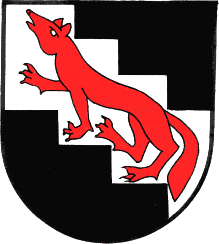Langegg bei Graz: Difference between revisions
Jump to navigation
Jump to search
Knorrepoes (talk | contribs) m (Text replacement - "|Arms of {{PAGENAME}}]]" to "|Coat of arms (crest) of {{PAGENAME}}]]") |
Knorrepoes (talk | contribs) m (Text replacement - "↵{{media}}↵↵Literature" to " {{at}} {{media}} Literature") |
||
| Line 26: | Line 26: | ||
The coat of arms attempts to represent this: Hence the fox (Fux) and the "stairs" (gradus). | The coat of arms attempts to represent this: Hence the fox (Fux) and the "stairs" (gradus). | ||
{{at}} | |||
{{media}} | {{media}} | ||
Revision as of 05:14, 27 September 2023
Austria heraldry portal
This page is part of the Austria heraldry portal |
Heraldry of the World |
|
Civic heraldry:
|
Other heraldry: |
LANGEGG BEI GRAZ
State : Steiermark
District : Graz-Umgebung
Incorporated into : 2015 Nestelbach bei Graz
| German | blazon wanted |
| English | blazon wanted |
Origin/meaning
The arms were granted on October 10, 1988.
Johann Joseph Fux, born in 1660 in today's Langegg, rose to become the famous Composer of the Baroque age in Austria, Court Composer to the Emperor. Among many other works, he wrote the "Gradus ad Parnassum", a book on musical theory.
The coat of arms attempts to represent this: Hence the fox (Fux) and the "stairs" (gradus).
Austria heraldry portal
This page is part of the Austria heraldry portal |
Heraldry of the World |
|
Civic heraldry:
|
Other heraldry: |
Contact and Support
Partners:
Your logo here ?
Contact us
© since 1995, Heraldry of the World, Ralf Hartemink 
Index of the site
Literature : Image provided by Karl Palfrader (k.palfrader@aon.at), MStLA 39 (1989), p. 34












